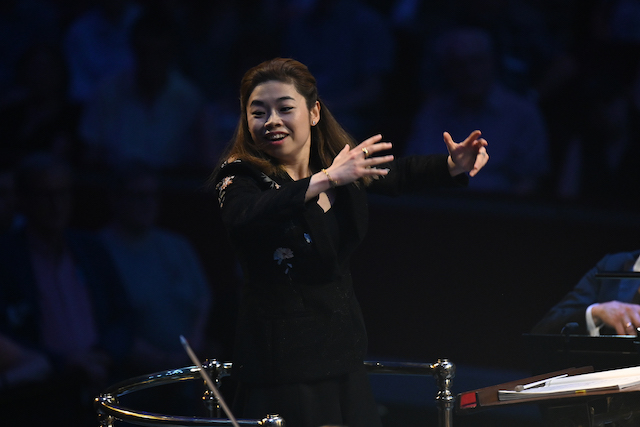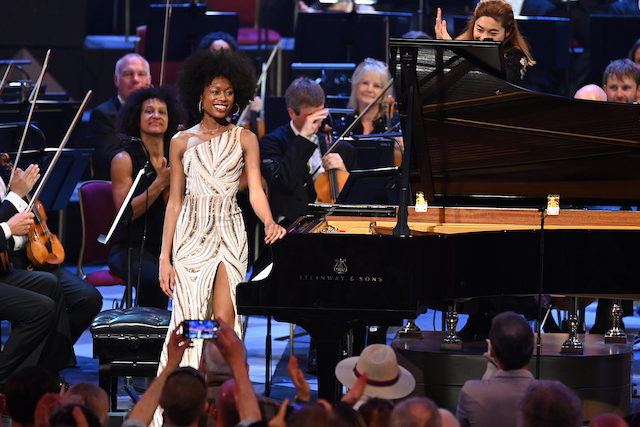The first night of the BBC’s 2024 Proms season was illuminated by the blazing brilliance of Isata Kanneh-Mason’s performance of Clara Schumann’s Piano Concerto and the world premiere of Ben Nobuto’s witty video-game-inspired Hallelujah Sim. Hong Kong born conductor Elim Chan presided over a vibrant, joyful evening in which apparent crowd-pleasers like Beethoven’s Fifth Symphony were balanced by pieces that ranged from the sublime to the mischievously meticulous.
The BBC Symphony Orchestra kicked off with Handel’s 1749 Music for the Royal Fireworks as an amuse bouche, which was rearranged in 1959 by the Australian conductor Charles Mackerras. Unlike the fraught 18th century premiere of the piece in Green Park – in which rain ruined the fireworks with the exception of a few that set the staging on fire – this was a polished stately performance, elevated by gilded notes from the trumpets and deft galloping interludes from the woodwind and strings.
Yet it was with Anton Bruckner’s Psalm 150 that the evening really started to take off, lifted in no small part by the BBC Singers and the BBC Symphony Chorus. It opened with a radiant blast of sound in the opening “Hallelujah”, introducing a sense of transcendence that swept through the auditorium. Chan masterfully alternated the psalm’s titanic triumphalism with a more introspective lyricism that first accompanied the words “Lobet den Herrn” (“Praise the Lord”). In the section for solo violin and soprano, the blackbird-eloquence of the violin part intertwined exquisitely with Sophie Bevan’s gorgeous swooping soprano.The more stormy fugue swept us to the resonant conclusion.
Exciting and uplifting thought this was, the undoubted highlight of the evening came when Isata Kanneh-Mason arrived on stage to perform the Clara Schumann concerto, composed when Clara was in her mid teens. This is a work that is very close to Kanneh-Mason’s heart – she recorded it along with other works by the composer on her début album in 2019. From her first dramatic entry in the Allegro maestoso she imbued it with a force and gravitas that gave it just as much of an impact as works by Clara’s contemporaries, including Chopin and her own husband Robert. It made you wonder what would have happened if Clara had been actively encouraged to continue to compose on a similar scale, rather than being encouraged to channel her energies into more domestic pursuits. 
I have heard many piano concertos in this hall and this performance, not least for the way in which Kanneh-Mason so completely inhabited the music, surpassed all of them. In the second, Romanze movement, the extreme weather systems of the Allegro maestoso were supplanted by a bewitching lyrical simplicity, subtly ornamented by Chopinesque flourishes. After a beguiling duet with a cello, she brought the same apparently effortless authority and brilliance to the Finale movement as she had to the first, not least in the dramatic ascending and descending chromaticised passages that brought it to its earth-shaking finish.
After the interval, a substantial shift in tone came with the world premiere of Japanese/English composer Ben Nobuto’s highly enjoyable Hallelujah Sim. Once more Chan demonstrated complete control of the orchestra as she guided them through Nobuto’s wilfully perverse work, which included a female robotic voiceover that gave instructions for how to perform a Hallelujah as if it were a video game.
Whirring and clicking sounds were interspersed by lines like “This is a step-by-step tutorial”, then gradually the orchestra and choir carried out the instructions with comedic jerkiness. As the piece progressed, synthetic electronic sound was increasingly interleaved with richer and longer sequences from the choir and orchestra. At the very end Chan collapsed onto her stand like a robot who’d run out of power, but her triumph was unmistakable. 
The first movement felt like watching gas particles collide beneath a microscope in a chemistry experiment as the notes wove in and out of each other at a dizzying pace. Chan’s control was impressive, as indeed was the orchestra’s, but it felt as if a certain drama was lost in the process. While the second movement had moments of honeyed lyricism, most of it felt stripped of emotion. It redeemed itself in the third movement, which despite starting like Beethoven on tiptoes, gradually took on a thrilling power that allowed us to end, in every way, on a high note.
The Beethoven did make me wonder about just giving the Prom four stars, but as my – normally highly sceptical – teenage son pointed out, Isata Kanneh-Mason’s performance alone deserved six stars, so I settled on a five. After last year’s exhilarating Proms season, this first Prom gave all the signs that this year’s is going to be every bit as exciting.













Add comment